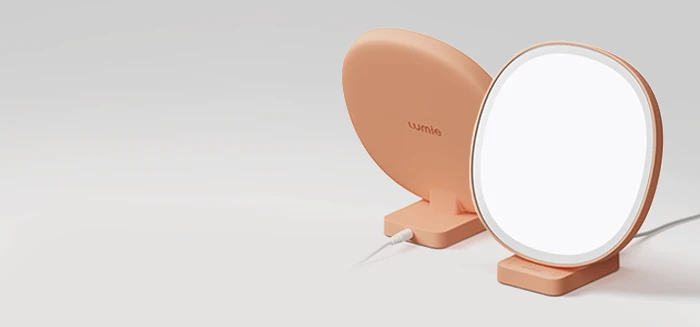Clock Change 101: When Do the Clocks Go Back and How Does The Time Change Affect Your Wellbeing?
.png)
It’s important to prioritise your wellbeing as the seasons change, putting in place new routines that will make you feel your happiest and healthiest self. Although it may feel like you’re taking the transition in your stride - embracing crisp autumnal walks and sweater weather - the reality is that the limited daylight post-clock-change is likely to affect your mood, making it a difficult time if you usually suffer from winter blues or Seasonal Affective Disorder.
The clocks change on Sunday 30th October 2022, meaning you’ll have to set your clock back an hour on Saturday evening if you want to wake up at the correct time on Sunday morning. This will mark the end of British Summer Time (BST) and the beginning of the darker, shorter days.
Any change in your daily rhythms can throw your body clock out of sync, and this disruption to your circadian rhythm can be detrimental to your sleep, mood and energy. This lack of energy and motivation is often down to the absence of strong morning light cues, which ordinarily would signal the pineal gland to stop producing the sleep hormone melatonin. You may also notice your mental health start to dip, which could indicate that you’re suffering from a seasonal mood disorder such as Seasonal Affective Disorder (SAD) or winter blues.
We humans thrive on routine and habits, so as the clocks go back, it’s even more important to have a sleep schedule that will continue a healthy circadian rhythm. Waking up with light is a great place to start, as it provides the brain's clock with one of its strongest signals, creating a starting point for the daily rhythms that control the highs and lows of energy, appetite, and sleepiness. Using a dawn simulator such as Bodyclock replicates the morning light cues that we’d usually receive from a summer sunrise to help you start your day right. You can also use Bodyclock’s sunset function in the evening to recreate the feeling of dusk hours after the sun has set, helping to further regulate your sleep/wake cycle. If you start to feel symptoms of SAD and winter blues creep in, bright light therapy is a great natural solution, shown to improve energy, boost mood and make you feel more awake.
As well as using light therapy to keep your body clock on track after the clock change, creating a restful sleep environment is a great way to prioritise your sleep. Banishing your phone from the bedroom, keeping set sleep/wake times and doing something mindful before bed (like journaling!) can all help maintain your mental wellbeing during autumn and winter.
With the clocks going back, our sleep/wake times will be an hour earlier than normal - meaning we gain an extra hour! Although it may be tempting to snooze past your typical wake time and use that extra hour to catch up on sleep, it’s better for your body clock to keep to your usual routine. We suggest taking the extra hour to do something for yourself, whether that’s an early morning walk, an hour phone-free to enjoy breakfast, or a coffee in bed while reading.
If you’re dreading the clocks going back and the darker days that follow, here are our top tips for coping with the clock change:
1. Don’t snooze – your body clock likes a regular routine so keep to the same wake-up time even at weekends.
2. Ditch a shrill phone alarm for a natural sunrise with Lumie Bodyclock.
3. Get some light exposure first thing – if you can’t get outside then use a Lumie light therapy lamp over breakfast - emits 10,000 lux at up to 35 cms distance.
4. Try to get outside for 30 minutes at lunchtime.
5. Use your bright light therapy lamp early afternoon to beat the post-lunch slump.
6. Avoid tech at least an hour before bedtime and use Lumie Halo’s low-blue light Evening Mode.
7. Use Lumie Bodyclock’s gentle sunset feature to help you drift off to a great night’s sleep.




